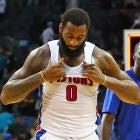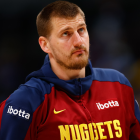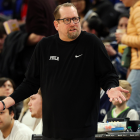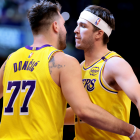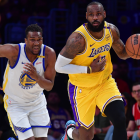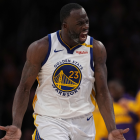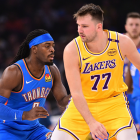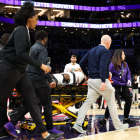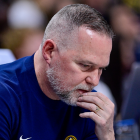
The relative weakness of the 2020 NBA free agent class has been well chronicled. Outside of Anthony Davis, who is considered a good bet to return to the Los Angeles Lakers, there are no superstars available. Brandon Ingram is restricted. Danilo Gallinari is unrestricted. DeMar DeRozan, Gordon Hayward and Andre Drummond all have player options.
You could argue Drummond is the best player in this non-superstar group. You could also argue he's the worst. As one Eastern Conference scout recently put it to CBS Sports: "[Drummond's] one of the hardest players to evaluate in the league."
It's true. The numbers for the Detroit Pistons' big man are elite through an across-the-board, traditional lens -- the only player in the league averaging at least 17 points, 15 rebounds, two steals and 1.5 blocks entering play on Friday. But nobody knows what, exactly, to make of these numbers in the grander context of value, and ultimately, winning.
Come this summer, a lot of teams are going to have a difficult decision to make as they mull Drummond's value. He has a $28.7 million player option for 2020-21, but most people believe he'll forego that option to seek a long-term payday on the open market.
Now comes the news on Friday that the Pistons and Hawks are engaged in trade talks for Drummond ahead of the February 6th deadline, per ESPN's Adrian Wojnarowski, who noted that other teams are also interested in Drummond and that the Pistons' big man is indeed unlikely to exercise his player option this summer. Pistons owner Tom Gores is also starting to indicate that Detroit is on the bring of a tear-down.
Vincent Goodwill of Yahoo Sports also reported that Boston, Toronto and Dallas have all registered interest in Drummond. The Celtics are particularly interesting, as an All-Star level big man is generally seen as the only thing between them and championship contention. To complete a Drummond deal, Boston would have to part with Marcus Smart or Gordon Hayward to make the money work. That would be tough to swallow, but they do have plenty of wing depth.
Earlier this year, I was told by a league source that Atlanta has indeed been monitoring Drummond, and if the Hawks were to trade for him, they would be doing so with the obvious intention of retaining him on a long-term deal that will surely come at a heavy price. Otherwise, they'd just be trading for a player who can walk this summer.
So how much is Drummond worth? And what might Atlanta be willing to pay him? Those might be two different questions, as the Hawks, with an expected $70 million in cap space this summer, might have to, or at least be willing to, overpay a bit to secure a player they see as a significant step forward in their mission to build a contender.
"I'll tell you this: I know for a fact there are teams that will say absolutely not, he's not worth a max," an Eastern Conference scout told CBS Sports earlier this year. "But I'll also say this: If I had to bet, I think that one team will. And all it takes is one, right?"
"[Atlanta] makes some sense," the scout said. "They have a ton of money coming up."
The Hawks are indeed interesting. A Drummond-Trae Young pick-and-roll speaks for itself, and John Collins could use a defensive anchor next to him. That said, Hawks GM Travis Schlenk told CBS Sports earlier this season that jumping into big contracts just because you have a lot of cap space is "the biggest mistake teams make."
Schlenk, in other words, is not going to throw money at anyone he doesn't feel adds, significantly, to the still impressive young core Atlanta is building, despite their struggles this season. If Drummond isn't worth a max contract, Atlanta would not appear, philosophically, to be an organization that would irresponsibly stretch its resources. But signs have been building all season that the Hawks are starting to run thin on patience.
Atlanta's front-office philosophies aside, Drummond is intriguing -- not just for the player he is, but even more so for the player it feels like he can still become. He's a world-class rebounder, obviously. When he's engaged (which isn't always the case), he's an elite paint/rim protector. He has a wonderful feel for dropping just enough on pick-and-rolls to give pause to the ball-handler while still accounting for the roller. A massive human being with extraordinary athleticism, he covers a TON of interior space without even really moving. When he is switched onto a perimeter player, he can move his feet as well as a lot of guards.
But the defense and rebounding are things we know about Drummond. They're his foundation. Sort of his "expected" value. It's the offense that really gets you excited, because there's so much raw ability there that still feels somewhat untapped, or at least unharnessed. How many 6-foot-11, 280-pound centers do you see putting the ball on the floor effectively as he can?
Drummond, again, is an elite athlete not just for someone his size, but for anyone. And his skills are starting to catch up with all that athleticism.
"He's gotten better at scoring around the rim with some creativity," the scout said. "You see these little flips with the left hand, or coming underneath for a reverse layup, those types of things. He's not a guy who just has to drop his shoulder and power to the rim. He's added some finesse to his game."
Specifics aside, Drummond, 26, has just added a better overall feel for operating in the post. He's an improved back-to-the-basket player with an effective jump hook with either hand. He runs the floor. He flashes effectively. Establishes early and low position. He can pass. And he can obviously handle the ball.
But just because you can do something doesn't necessarily mean you should.
For instance, per NBA.com, Drummond averages more dribbles per touch than any center in the league other than Julius Randle, and Randle isn't even really a center. Yes, Drummond can dribble, and that's a good thing, but there are times he looks like he's trying to be James Harden sizing up a defender, which is clearly a stretch.
Big men who can rebound and push have a huge leg up in today's game that's all about pace. Forget the outlet, just board and go. Drummond can clearly do that. But all this ball handling and one-on-one offense is the stuff of true No. 1 options.
"He is not a No. 1 option," the scout told CBS Sports. "He's having to play like that right now for Detroit, but he's not a No. 1 guy."
This is where Drummond is probably overtaxed as a go-to player on a limited Pistons team. The real intrigue with Drummond is imagining him as a supporting act on a good team -- probably a No. 3 option on a true contender. If you could harness all these abilities within a role that doesn't stretch any of them too far, that allows him to focus on defense and rebounding while providing peripheral offense, that becomes scary.
Drummond as a paint-protecting, monster-rebounding big man who can punish switches, score on situational post-ups and create one-on-one offense when called upon, is probably something close to a max player.
With one caveat.
He has to try.
Not some of the time. All of the time. Drummond is not exactly a max-effort player. Even his historically great rebounding numbers aren't really a product of "having a nose for the ball" or "outworking his opponents" or any of the other romantic, blue-collar traits we love to attach to great board men. The simple truth is he's just bigger, stronger and more athletic than everyone else.
If Drummond gave Dennis Rodman effort, he'd be the greatest rebounder, and one of the greatest defenders, ever. He has that kind of ability. It's not to say Detroit's 24th-ranked defense is his fault, but he's clearly not raising the level of those around him. Too many times his "lurking" in the paint will just turn into lounging. He'll rotate late. He'll lazily recover. He'll try to block shots from behind, just a long-armed reach at the last second when he's been beaten to the rim.
"That's always been the hangup with [Drummond]," the scout said. "What day is it? What player is going to show up tonight? So then you think about it from a contract standpoint. Right now, this is a big year for him. This is a contract year, basically. So he is putting up these huge numbers. But is he going to give that effort every single night after he gets paid?"
If Drummond does continue to grow and give max effort, he can be a dominant player that is worth A LOT of money. If he doesn't do those things, some team is going to be stuck with a bad contract. He's a classic high-risk, high-reward player. The question is: Who's going to take the risk? Might the Hawks be ready to move?
![[object Object] Logo](https://sportshub.cbsistatic.com/i/2020/04/22/e9ceb731-8b3f-4c60-98fe-090ab66a2997/screen-shot-2020-04-22-at-11-04-56-am.png)









